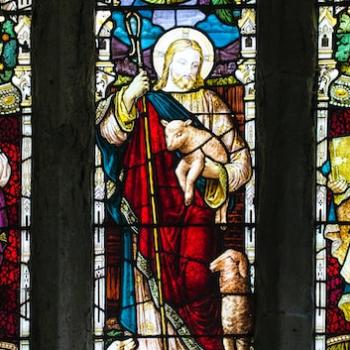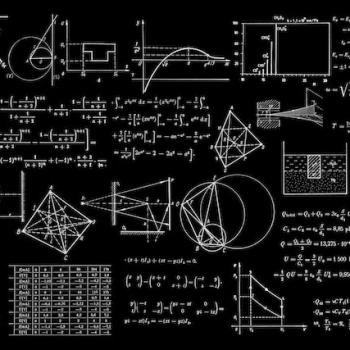Yesterday’s gospel reading begs the question: if Jesus ascended into heaven over 2,000 years ago, where is he now?

I’m currently reading the latest edition of a fantastic book, Forming Intentional Disciples, by Sherry A. Weddell. The author talks about hearing three different homilies three weeks in a row by three excellent priests in three different parishes. In each one, the priest used the phrase, “when Jesus was on earth.” The author found that perplexing because such language assumes that wherever Jesus is, it’s not here with us today. She makes a point of noting that all three said these words while standing within a few feet of the Tabernacle.
What on earth do we mean when we talk about Jesus being present with us? On Earth, in our hearts, in the Eucharist? These are perfect questions for us as we celebrate the Feast of the Ascension.
What’s Up with Ascension Anyway?
Ascension doesn’t always fall on the Seventh Sunday of Easter. Historically, it’s been celebrated on the Thursday of that week. But many churches have moved this observation to the nearest Sunday, usually the Seventh Sunday of Easter. When celebrated separately, the gospel readings for the Seventh Sunday in all liturgical cycles feature Jesus praying for and with his disciples in preparation for “leaving them.” And of course, Ascension celebrates that very leave-taking. So, discussing them together just makes sense.
I’ve always envied my evangelical Protestant friends’ deep, personal, relationship-based spirituality. Once they “accepted Jesus as their personal Lord and Savior,” he became the object of their worship, their guarantee of eternal life after death, their confidant and confessor, their constant companion and faithful friend. I will admit to being jealous of the up-close-and-personal nature of their faith.
But as appealing as it is in some ways, it’s downright mind-boggling to me in others. When I hear the word “Jesus,” my mind’s eye conjures up an image of the real human who walked upon the Earth, one who I picture as male with a medium-to-dark complexion. He has mid-length hair and a beard, and he wears the typical robes of his time and geography.
A Real Human Person
Did he really look like that? No idea. But bottom line . . . when I hear the word “Jesus,” I envision a real, human person. And if I had the technology to search every last millimeter of on, over, under, and around this planet, I would not see this person alive today.
The author of Forming Intentional Disciples recoiled at the three priests’ words on those three separate Sundays because Church teaching is clear. Catholics believe that even after Jesus “ascended into heaven,” which we celebrate on or around the Seventh Sunday of Easter, Jesus is still with us.
My response to that tenant of our faith is . . . “well, yes, but….”
I have repeatedly written that Catholic Christianity’s biggest problem is one of language. Case in point – we often use the words Jesus, Christ, and God to refer to the same thing. But aren’t they the same when it comes to religious faith? Well, yes, but….
The Limitations of Language
Our language is limited by our experiences, and any interpretation of our experiences is limited by, well, us. In other words, we are people – individual, human creatures – so the only way we can grapple with and share our perspectives about our life experiences is through people-centered language. All we can be is who we are. All we can speak of is what we know.
As a result, we have no other alternative than to use human words to explain way-beyond-human realities. It’s like me trying to dress modestly wearing only a ribbon. While it’s sort of the right idea and is headed in the right direction, it misses the mark, and lots of stuff is left hanging.
A lot is also left hanging when we try to talk about God. If I say that I have a “relationship with Jesus,” I’m not being literal. That’s just me. The “Jesus” I know is a person of history. Despite what anyone believes – or doesn’t – about the Resurrection and the Ascension, I simply cannot believe that you or I or anyone else will ever encounter that historical person ordering a latte at Starbucks one day. That specific, unique individual is no longer walking the Earth. Given this, I don’t think I can honestly say that I have a “personal relationship with Jesus.”
But that doesn’t mean I can’t have a personal relationship with God, one that is shaped indelibly by the life, death, and ministry of the historical Jesus.
What Does It Mean To Be Present?
It all comes down to what we mean by the word “present.” In Forming Intentional Disciples, Ms. Waddell struggled with the three priests who referred to a time “when Jesus was on Earth” mere feet from the Tabernacle. Of course, Catholics believe that Jesus is present in the Eucharist. My response to that? Well, yes, but….
I prefer to say that “Christ is present in the Eucharist.” For me, just changing that one word moves this belief statement from the confusing arena of mystical cannibalism to the real-life realm of meaningful communion.
The director of worship in my archdiocese explained it this way to high school students. We can look at the hosts used at Mass under a microscope both before and after the consecration, and we will see the same cells. The physical matter does not change. But something is different.
Real Presence
She equated this to the difference that a person experiences before and after they walk across the stage and receive their diploma at graduation. Or before and after a couple gets married. Sure, the people are the same, but they are different too. They show up differently in the world after the graduation or wedding. New possibilities become open to them that were not available before. Same individuals, different reality.
I believe in the “real presence of Christ” in the Eucharist. After receiving the sacrament, if we are truly paying attention, we are able to show up differently in the world. New possibilities become open to us that were not available before.
Father Richard Rohr has written a great deal about inadequacy of using the word “Christ” as Jesus’ last name. The root word in both Hebrew and Greek means “anointed.” I think the word “Christ” is the best – perhaps only – word we have to describe this same individual Jesus of history in whom we now experience a different reality.
Back to the Ascension
For me, the Feast of the Ascension is metaphorical, not literal. I don’t think the historical person named Jesus levitated into the clouds and out of sight. I simply can’t believe something that doesn’t align with established science and my own experience of the world. The gospel writers had a job to do. They needed to bring the narrative to a logical conclusion while preserving Jesus as “Christ.” Dying again after rising from the dead would seem . . . anti-climactic. Not very God-like.
In Jesus’ time, the “heavens” were thought to be way above the clouds. Since that time, we have discovered ways to see into the far reaches of the universe. There are no Pearly Gates at 100,000 feet. But it made sense that the gospel writers of the time used the only language and concepts they had to describe a reality that was beyond their comprehension.
Words Matter
Language is a bridge to freedom, shared understanding, and creative expression. And it’s also a cruel prison warden, all at the same time. The very thing that enlarges our experience of the world also limits it.
Sure, if you have a personal relationship with Jesus, that’s fantastic. While that language doesn’t completely work for me, I do recognize the benefit of metaphor and shorthand. After all, it’s easier to understand a human relationship with another human than with . . . something else we don’t even have words to define.
What we mean when we talk about Jesus being “present” says a lot about our understanding of what it means to “believe.” For me, many Church teachings leave me saying, “Well, yes, but….” I’m okay with that. No matter how you slice it, the heart of my response is “yes.”












